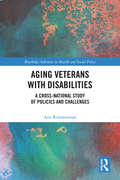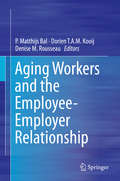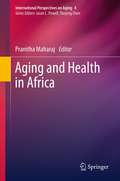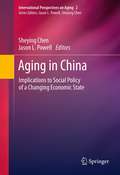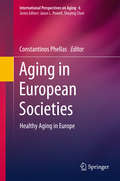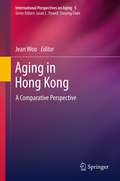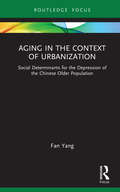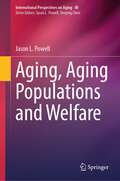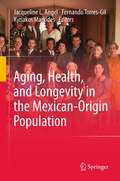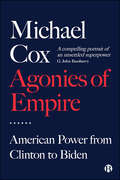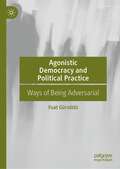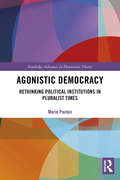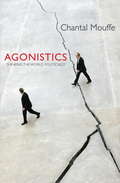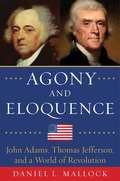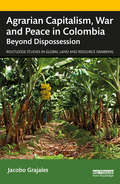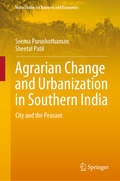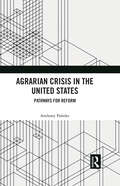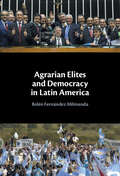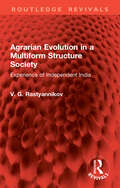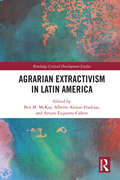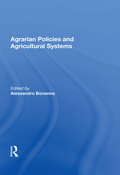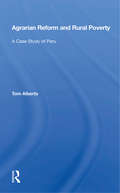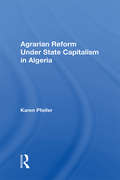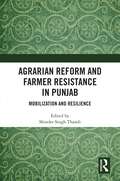- Table View
- List View
Aging Veterans with Disabilities: A Cross-National Study of Policies and Challenges
by Arie RimmermanThe number of older war veterans receiving disability benefits is steadily growing and is predicted to rise in the next decade. This book provides comprehensive knowledge about health and psychosocial concerns of veterans aging with disabilities and unmet needs and compares policy in three countries that have been involved in massive warfare in the 20th century––the United Kingdom (UK), the United States (US), and Israel. Using a cross-national comparative study of the policies, legislation and services provided by these three countries, which have significant numbers of aging disabled military veterans, this book provides evidence-based knowledge on the trajectories and attendant mental-health and psychosocial problems this sub-group faces when aging with a disability. It sheds light on the paradox in which most veterans with disabilities in the UK, USA and Israel are older, while the current legislation and budget target younger veterans with disabilities. The book reflects the current debate regarding the desired policy toward older veterans with disabilities in these countries and whether to provide them with proactive health services prior to retirement to prevent "accelerated aging". It also evaluates the dilemma of whether to serve aging veterans separately as a unique population or to provide them with the same services used by the general population. This book will be of interest to all academics and students working in disability studies, rehabilitation studies, gerontology, psychology, sociology, social work, social policy, and law more broadly.
Aging Workers and the Employee-Employer Relationship
by Denise M. Rousseau P. Matthijs Bal Dorien T.A.M. KooijThis book focuses on the aging workforce from the employment relationship perspective. This innovative book specifically focuses on how organizations can ensure their aging workers remain motivated, productive and healthy. In 15 chapters, several experts on this topic describe how organizations through effective human resource management can ensure that workers are able to continue working at higher age. In addition, this book discusses the role older workers themselves play in continuing work at higher age. To do this, the authors integrate research from different areas, such as literature on leadership, psychological contracts and diversity with literature on the aging workforce. Through this integration this book provides innovative ways for organizations and workers to maintain productivity, motivation and health. Aging Workers and the Employee-Employer Relationship summarizes the latest research on how employment relationships change with age and its implications for supporting the well-being, motivation and productivity of older workers. It identifies ways to improve how both companies and workers solve the problems they face. These include better designed employment practices and more adaptive job content and developmental opportunities for aging workers along with activities aging workers can engage to enhance their own job crafting, learning and employability.
Aging and Health in Africa (International Perspectives on Aging #4)
by Pranitha MaharajPopulation aging is a matter of global concern. It often occurs in tandem with changes in the health profile of the population. In Africa, many countries are already facing a high burden of communicable diseases. However, as more and more children survive childhood and move on to adult years and old age they are also more likely to experience health problems associated with the aging process. Population aging in Africa is occurring in the context of high levels of poverty, changing family structures, an immense disease burden, fragile health systems and weak or poorly managed government institutions. This book shows that aging is likely to lead to increased social and economic demands for the continent. However, most national governments in Africa have not begun to address the issue of how to respond effectively to the needs of the older population. This will require a better understanding of the socio-economic and demographic situation of the older population in Africa. This book fills the gaps that exist by exploring the social realities of population aging in Africa. It also focuses on the policy and programmatic responses, gaps and future challenges related to aging across the continent.
Aging in China: Implications to Social Policy of a Changing Economic State (International Perspectives on Aging #2)
by Jason L. Powell Sheying ChenChina, which is fast on its way to becoming the most powerful economic force in the world, has four unique characteristics that distinguish it from other countries in Asia: (1) The proportion of aging population is growing faster than that of Japan (the country previously recognized as having the fastest rate) and much faster than nations in western Europe. (2) An early arrival of an aging population before modernization has fully taken place, with social policy implications. It is certain that China will face a severely aged population before it has sufficient time and resources to establish an adequate social security and service system for older people. (3) There will be fluctuations in the total dependency ratio. The Chinese government estimates are that the country will reach a higher dependent burden earlier in the twenty-first century than was previously forecast. (4) The government's fertility policy (single child per family) and its implementation has a strong influence on the aging process. Fewer children are being born, but with more elderly people a conflict arises between the objectives to limit population increase and yet maintain a balanced age structure (Peng and Guo 2001). The intersection of these fourfold factors means that the increased aging population is giving rise to serious concerns among Chinese social policy makers. There is a chronic lack of good resource materials that attempt to make sense of social policy in its relationship to examining the problems and possibilities of human aging grounded in an analysis of economic of social policy in China and impact on rural and urban spaces. Such analysis of China will be covered by conceptual, theoretical, and empirical approaches. The book will also discuss substantive topics of housing, community care, family care, pensions, and mental health. The book brings together a truly world class array of researchers to provide discussions of critical implications of aging social policy and the economic impact in China.
Aging in European Societies: Healthy Aging in Europe (International Perspectives on Aging #6)
by Constantinos PhellasBetween longer life expectancies and declining birth rates, Europe's elder population is growing into a sizable minority with considerable impact on nations, health systems, and economies--in other words, global implications as well as local and regional ones. Those investing in the health of older adults need a double perspective: the social and clinical complexity of aging and the larger forces shaping these experiences. Aging in European Societies examines aging trends across the continent, analyzing individual and collective variables that affect the lives of older adults, and drawing salient comparisons with other parts of the world. An interdisciplinary panel of experts provides theory, research, and empirical findings (with examples from the UK, Cyprus, Sweden, and others) in key areas such as family and social supports, physical and cognitive changes, dependence and autonomy issues, and living arrangements. The book's wide-net approach offers insights into not only aging, but aging well. And of particular importance, it details approaches to defining and measuring the elusive but crucial concept, quality of life. Included in the coverage: The potential for technology to improve elders' quality of life.Dementia and quality of life issues.Changes in functional ability with aging and over time.Family networks and supports in older age.Factors influencing inequalities in quality of life.Late-life learning in the E.U. Gerontologists, sociologists, health and cross-cultural psychologists, and public health policymakers will welcome Aging in European Societies as a springboard toward continued discussion, new directions for research, and improvements in policy and practice.
Aging in Hong Kong: A Comparative Perspective (International Perspectives on Aging #5)
by Jean WooWith the longest life expectancy for men and the second longest for women, Hong Kong typifies our planet's aging population. The daily lives of its older adults closely match the advantages and disadvantages experienced by urban elders in other developed countries. For these reasons, Hong Kong's elderly serve as a salient guide to older people's social, psychological, and healthcare needs--concerns of increasing importance as the world grows older. Aging in Hong Kong examines this emblematic population as a case study specifically in comparison with their counterparts in the West, shedding light on diverse, interrelated currents in the aging experience. Referencing numerous international studies, the book contrasts different health service arrangements and social factors and relates them to a variety of health outcomes. Its wide-ranging coverage documents health and illness trends, reviews age-friendly policy initiatives, relates health literacy to patients' active role in their own care, and discusses elders as an underserved group in the division of limited health funding and resources. This multiple focus draws readers' attention to policies that need revisiting or retooling as chapters analyze major life areas including: Living environment.Retirement and post-retirement employment issues.Financial asset management.Health literacy regarding aging issues.Elder-positive service delivery models.Ageism in the prioritization of healthcare.End-of-life issues. By assembling such a wealth of data on its subject, Aging in Hong Kong puts ongoing challenges into clear focus for gerontologists, sociologists, health and cross-cultural psychologists, public health policymakers, and others involved in improving the quality of elders' lives.
Aging in the Context of Urbanization: Social Determinants for the Depression of the Chinese Older Population (China Perspectives)
by Fan YangAs China has undergone rapid urbanization and population aging in the past few decades, improving the welfare of older people in rural areas has become an ever more pressing issue. This title is the first book-length work to examine the influence of urbanization on the mental health of China’s older population outside the city. Incorporating the theoretical framework of social ecology, the author analyzes the socio-cultural factors that have exerted an impact on participants’ mental health, such as their personal life course transition, changes to family living arrangements and community restructuring. Moreover, he introduces several elderly mental health intervention models in China, while evaluating the policy initiatives that have developed based on China’s local resource sufficiency, cultural customs, and older people's needs. The research findings not only facilitate a deeper understanding of China's welfare policy making, but also offers a useful reference for countries that are experiencing similar urbanization and population aging and that wish to formulate better social policies. Students and scholars of social policy, welfare, and gerontology will find this title to be essential reading.
Aging, Aging Populations and Welfare (International Perspectives on Aging #40)
by Jason L. PowellAs the world experiences a rapid increase in the aging population, it is essential to address the challenges and opportunities that arise as a result. This book explores the significant impact of aging on individual well-being, societal welfare systems, and the global economy. By examining the multifaceted aspects of aging, demography and welfare, the book aims to provide a comprehensive and critical narrative to navigating these challenges and achieving better outcomes for both older individuals and society as a whole. The book has a critical approach running through it; despite this, there is a need to do something with the critical questions and focus on sustainable solutions to problems and issues an aging population poses to researchers, policy makers and older people themselves. In essence, the primary purpose of this book is to shed light on the complexities surrounding aging, demography and its intersection with welfare systems. By delving into various perspectives, such as social, economic, and healthcare considerations, this book highlights the holistic understanding needed to address the challenges associated with an aging population effectively.
Aging, Health, and Longevity in the Mexican-Origin Population (Social Disparities In Health And Health Care Ser.)
by Jacqueline L. Angel Fernando Torres-Gil Kyriakos MarkidesAging, Health, and Longevity in the Mexican-Origin Population creates a foundation for an interdisciplinary discussion of the trajectory of disability and long-term care for older people of Mexican-origin from a bi-national perspective. Although the literature on Latino elders in the United States is growing, few of these studies or publications offer the breadth and depth contained in this book.
Agonies of Empire: American Power from Clinton to Biden
by Michael CoxThe defeat of Donald Trump in November 2020 followed by the attack on the US Congress on 6th January 2021 represented a tipping point moment in the history of the American republic. Divided at home and facing a world sceptical of American claims to be the ‘indispensable nation’ in world politics, it is clear that the next few years will be decisive ones for the United States. But how did the US, which was riding high only 30 years ago, arrive at this critical point? And will it lead to the fall of what many would claim has been one of the most successful empires of modern times? In this volume, Michael Cox, a leading scholar of American foreign policy, outlines the ways in which five very different American Presidents – Clinton, Bush, Obama, Trump and now Biden – have addressed the complex legacies left them by their predecessors while dealing with the longer-term problems of running an empire under increasing stress. In so doing, he sets out a framework for thinking critically about US foreign policy since the end of the Cold War without ever losing sight of the biggest question of all: can America continue to shape world affairs or is it now facing long-term decline?
Agonistic Democracy
by Mark WenmanThis pioneering book delivers a systematic account of agonistic democracy, and a much-needed analysis of the core components of agonism: pluralism, tragedy, and the value of conflict. It also traces the history of these ideas, identifying the connections with republicanism and with Greek antiquity. Mark Wenman presents a critical appraisal of the leading contemporary proponents of agonism and, in a series of well-crafted and comprehensive discussions, brings these thinkers into debate with one another, as well as with the post-structuralist and continental theorists who influence them. Wenman draws extensively on Hannah Arendt, and stresses the creative power of human action as augmentation and revolution. He also reworks Arendt's discussion of reflective judgement to present an alternative style of agonism, one where the democratic contest is linked to the emergence of a militant form of cosmopolitanism, and to prospects for historical change in the context of neoliberal globalisation.
Agonistic Democracy and Political Practice: Ways of Being Adversarial
by Fuat GürsözlüThis book explores the implications of agonistic democratic theory for political practice. Fuat Gürsözlü argues that at a time when political parties exacerbate political division, political protesters are characterized as looters and terrorists, and extreme partisanship and authoritarian tendencies are on the rise, the agonistic approach offers a much-needed rethinking of political practice to critically understand challenges to democracy and envision more democratic, inclusive, and peaceful alternatives. Inspired by Chantal Mouffe’s agonistic theory and drawing on insights of other prominent agonistic scholars, Gürsözlü offers a distinctive approach that develops the connections between the agonistic approach and political practice. His main claim is that approaching democratic politics from an agonistic perspective changes the way we understand the nature of democratic society, the place of political protest in democracy, the nature of adversarial engagement, and the democratic function of political parties. The book also advances an account of agonistic peace that is best fitted to the pluralistic and inherently conflictual nature of democratic societies. This book should be of interest to anyone working in the field of contemporary political theory, political philosophy, peace studies, and philosophy of peace.
Agonistic Democracy: Rethinking Political Institutions in Pluralist Times (Routledge Advances in Democratic Theory)
by Marie PaxtonAgonistic Democracy explores how theoretical concepts from agonistic democracy can inform institutional design in order to mediate conflict in multicultural, pluralist societies. Drawing on the work of Foucault, Nietzsche, Schmitt, and Arendt, Marie Paxton outlines the importance of their themes of public contestation, contingency and necessary interdependency for contemporary agonistic thinkers. Paxton delineates three distinct approaches to agonistic democracy: David Owen’s perfectionist agonism, Mouffe’s adversarial agonism, and William Connolly and James Tully’s inclusive agonism. Paxton demonstrates how each is fundamental to enabling citizens to cultivate better virtues for themselves and society (Owen), motivating democratic engagement (Mouffe) and enhancing relations of respect and understanding between conflicting citizens (Connolly and Tully). Situated within the context of a deeply polarised post-Trump America and post-Brexit Britain, this book reveals the need to rethink our approach to conflict mediation through democratic institutions. Pulling together insights from experimental research with deliberative democratic innovations, Paxton explores how agonistic theory might be institutionalised further. Through discussing ways in which agonistic institutions might be developed to render democracy more virtuous, more engaging, and more inclusive, Agonistic Democracy provides a unique resource for students of contemporary political theory.
Agonistics
by Chantal MouffePolitical conflict in our society is inevitable, and its results are often far from negative. How then should we deal with the intractable differences arising from complex modern culture? Developing her groundbreaking political philosophy of agonistics - the search for a radical and plural democracy - Chantal Mouffe examines international relations, strategies for radical politics, the future of Europe and the politics of artistic practices. She shows that in many circumstances where no alternatives seem possible, agonistics offers a new road map for change. Engaging with cosmopolitanism, post-operaism, and theories of multiple modernities she argues in favour of a multipolar world with real cultural and political pluralism.From the Trade Paperback edition.
Agony and Eloquence: John Adams, Thomas Jefferson, and a World of Revolution
by Daniel Mallock<P>The drama of John Adams and Thomas Jefferson is the foundational story of America--courage, loyalty, hope, fanaticism, greatness, failure, forgiveness, love. <P> Agony and Eloquence is the story of the greatest friendship in American history and the revolutionary times in which it was made, ruined, and finally renewed. <P> In the wake of Washington’s retirement, longtime friends Thomas Jefferson and John Adams came to represent the opposing political forces struggling to shape America’s future. Adams’s victory in the presidential election of 1796 brought Jefferson into his administration--but as an unlikely and deeply conflicted vice president. <P>The bloody Republican revolution in France finally brought their political differences to a bitter pitch. In Mallock’s take on this fascinating period, French foreign policy and revolutionary developments--from the fall of the Bastille to the fall of the Jacobins and the rise of Napoleon--form a disturbing and illuminating counterpoint to events, controversies, individuals, and relationships in Philadelphia and Washington. <P>Many important and fascinating people appear in the book, including Thomas Paine, Camille Desmoulins, Dr. Benjamin Rush, Tobias Lear, Talleyrand, Robespierre, Danton, Saint-Just, Abigail Adams, Lafayette, James Madison, John Quincy Adams, Dr. Joseph Priestley, Samuel Adams, Philip Mazzei, John Marshall, Alexander Hamilton, and Edward Coles. They are brought to life by Mallock’s insightful analysis and clear and lively writing. <P>Agony and Eloquence is a thoroughly researched and tautly written modern history. When the most important thing is at stake, almost anything can be justified. <P><b>A New York Times Bestseller</b>
Agrarian Capitalism, War and Peace in Colombia: Beyond Dispossession (Routledge Studies in Global Land and Resource Grabbing)
by Jacobo GrajalesBased on extensive research conducted in Colombia since 2009, this book addresses the connection between land grabbing and agrarian capitalism, as well as the unfulfilled promises of peace and justice. While land remains a key resource at the core of many contemporary civil wars, the impact of high-intensity armed violence on the formation of agrarian capitalism is seldom discussed. Drawing on nearly 200 interviews, archival research, and geographical data, this book examines land grabbing and the role of violence in capital with a particular focus on one key actor in the Colombian civil war: paramilitary militias. This book demonstrates how the intricate ties between armed conflict and economy formation are obscured by the widespread belief that violence is a radical form of action, breaking with the normal course of society and disconnected from the legal economy. Under this view, dispossession is perceived as diametrically opposed to capitalist accumulation. This belief is enormously influential in precisely those bureaucratic agencies that are in charge of peacebuilding, both domestically and internationally. However, this narrow view of the relationship between armed violence and capitalism belies the close ties between plunder and lawful profit, and obscures the continuity between violent dispossession and the free market. By the same token, it legitimizes post-war inequality in the name of capitalist development. The book concludes by arguing that the promotion of radical democracy in the government of land and rural development emerges as the only reasonable path for pacifying a violent polity. The book is essential reading for students, scholars, and development aid practitioners interested in land and resource grabbing, agrarian capitalism, civil wars, and conflict resolution.
Agrarian Change and Urbanization in Southern India: City and the Peasant (India Studies in Business and Economics)
by Seema Purushothaman Sheetal PatilThis book takes readers on a journey through the evolution of agricultural communities in southern India, from their historical roots to the recent global neo-liberal era. It offers insights into a unique combination of themes, with a particular focus on agrarian change and urbanisation, specifically in the state of Karnataka where both aspects are significant and co-exist. Based on case studies from Karnataka in South India, the book presents a regional yet integrated multi-disciplinary framework for analysing the persistence, resilience and future of small farmer units. In doing so, it charts possible futures for small farm holdings and identifies means of integrating their progress and sustainability alongside that of the rest of the economy. Further, it provides arguments for the relevance of small holdings in connection with sustainable livelihoods and welfare at the grass roots, while also catering to the welfare needs of society at the macro level. The book makes a valuable contribution to the scholarship of agrarian as well as peri-urban transdisciplinary literature. For agrarian academics, students and the teaching community, the book’s broad and topical coverage make it a valuable resource. For development practitioners and for those working on issues related to urbanisation, urban peripheries and the rural–urban interface, this book offers a new perspective that considers the primary sector on par with the secondary and tertiary. It also offers an insightful guide for policymakers and non-government organisations working in this area.
Agrarian Crisis in the United States: Pathways for Reform
by Anthony PahnkeFrom fragile, corporate-controlled supply chains breaking down, to millions of already hyper-exploited farmworkers risking their lives in the fields without basic personal protective equipment, the COVID-19 pandemic made it painfully obvious that US agriculture does not work. Agrarian Crisis in the United States: Pathways for Reform situates the many food system problems that the COVID-19 pandemic laid bare in historical context across four key policy areas, namely, in land, labor, markets, and the environment. In applying and building from the work of Jürgen Habermas, Agrarian Crisis in the United States highlights how deep-seated problems concerning systemic racism, economic inequality, and political legitimacy endanger the US food and farm system’s future. Besides analyzing crises, it presents solutions that would make agriculture in the United States more just and resilient through the implementation of certain communication and policy strategies. Its original argument, as well as a novel set of remedies, will appeal to scholars and activists with interests in agrarian studies, environmental policy, and social movements.
Agrarian Elites and Democracy in Latin America
by Belén Fernández MilmandaThis groundbreaking book delves into the underexplored realm of agrarian elites and their relationship to democracy in Latin America. With a fresh perspective and new theory, it examines the strategies these elites use to gain an advantage in the democratic system. The book provides a detailed examination of when and how agrarian elites participate in the electoral arena to protect their interests, including a novel non-partisan electoral strategy. By providing a deeper understanding of how democratic institutions can be used to protect economic interests, this book adds to the ongoing debate on the relationship between economic elites, democracy, and redistribution. Agrarian Elites and Democracy in Latin America is a must-read for anyone interested in politics, democracy, inequality, and economic power in the Global South.
Agrarian Evolution in a Multiform Structure Society: Experience of Independent India (Routledge Revivals)
by V. G. RastyannikovIndia in the 1950s and 1960s, with its diversity of economic structures and different levels of regional development, offers a unique opportunity to explore a wide range of agrarian evolution within a multiform society. Basing his study on an extensive survey of the existing literature as well as on fieldwork conducted in India, the author analyses in his book Agrarian Evolution in a Multiform Structure Society (first published in English in 1981) the roots of the Indian society and suggests future directions. He argues that India, like many Asian countries, exhibits tendencies peculiar to an economy evolving on the basis of dependent capitalist development.The author goes on to show how the state, in seeking to ease the teething problems of development, has assumed a decisive role, expressed in terms of the nationalisation of certain sectors of private exploitative property, and in the supersession of private interests by public ones. The historically inevitable progress of Indian society is therefore a paradoxical one: because its economy exists on the periphery of its system-moulding structure—world capitalism—it has special problems reconciled only by state intervention, this in turn makes the development of a capitalist society impossible. The result is a unique study of a society which has assumed increasing importance in world affairs.
Agrarian Extractivism in Latin America (Routledge Critical Development Studies)
by Ben M. McKay; Alberto Alonso-Fradejas; Arturo Ezquerro-CañeteAmid the growing calls for a turn towards sustainable agriculture, this book puts forth and discusses the concept of agrarian extractivism to help us identify and expose the predatory extractivist features of dominant agricultural development models. The concept goes beyond the more apparent features of monocultures and raw material exports to examine the inherent logic and underlying workings of a model based on the appropriation of an ever-growing range of commodified and non-commodified human and non-human nature in an extractivist fashion. Such a process erodes the autonomy of resourcedependent working people, dispossesses the rural poor, exhausts and expropriates nature, and concentrates value in a few hands as a result of the unquenchable drive for profit by big business. In many instances, such extractivist dynamics are subsidized and/or directly supported by the state, while also dependent on the unpaid, productive, and reproductive labour of women, children, and elders, exacerbating unequal class, gender, and generational relations. Rather than a one-size-fits-all definition of agrarian extractivism, this collection points to the diversity of extractivist features of corporate-led, external-input-dependent plantation agriculture across distinct socio-ecological formations in Latin America. This timely challenge to the destructive dominant models of agricultural development will interest scholars, activists, researchers, and students from across the fields of critical development studies, rural studies, environmental and sustainability studies, and Latin American studies, among others.
Agrarian Policies And Agricultural Systems
by Alessandro BonannoThis book is a comparative analysis of the agrarian policies and the agricultural systems of the European Community (EC) and the United States (US). It provides an overview of the agricultural policies of the EC and US, their stated objectives, and their impact on both agricultural sectors.
Agrarian Reform And Rural Poverty: A Case Study Of Peru
by Tom AlbertsBased on extensive data for land ownership, income distribution, and agricultural production, this book assesses Peru's experience with development planning since 1950 and discusses efforts to improve the standard of living of its rural population through changes in agrarian structure. .
Agrarian Reform Under State Capitalism In Algeria
by Karen PfeiferThis book examines Algeria's development program through the prism of the agrarian transformation of the 1970s. It provides some insight into the nature of Algeria's social formation today, and into a developmental process common to many Third World countries.
Agrarian Reform and Farmer Resistance in Punjab: Mobilization and Resilience
by Shinder Singh ThandiThis book examines the different dimensions of farmer agitations in Punjab, India. It situates the 2020–2021 farmer resistance movement within the wider context of India’s post-independent development trajectory and provides a thorough analysis of various aspects of the farmers' movement in India. The volume contextualizes Punjab’s history of farmer resistance, organization and mobilization strategies, the globalization of the movement, ways of both sustaining the movement and building resilience. While providing a critical understanding of the three farm laws introduced in India in 2020, the book looks at how they may impact farm operations and livelihoods in the post-Green Revolution period and evaluates strategies of inclusive mobilization for gathering support and sustaining the movement both within India and abroad, with special focus on the role of the Sikh diaspora. Essays in this volume also discuss the participation of women in the struggle and how their experience has the potential to transform gender relations both at home and in the public sphere. Integrated, comprehensive, and concisely written by well-known experts, this book will be of interest to those involved with Punjab’s social, political, and economic history, and students and researchers of food and agriculture in developing countries, peasant and social movements, Indian federalism and role of diasporas as non-state actors.
